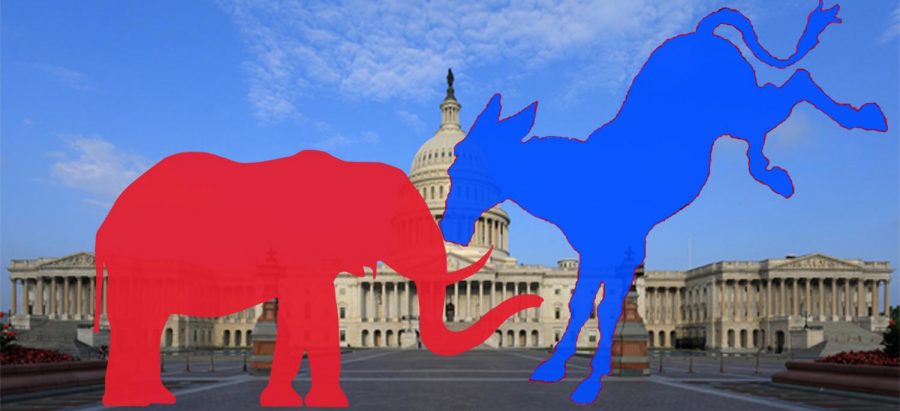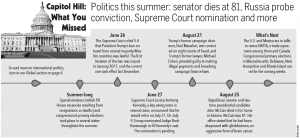The Partisan Trap
Congress has been in a partisan gridlock this year more than ever.
September 20, 2018
After the recent passing of John McCain, a war hero of the Vietnam War and five-term senator of Arizona, many memorialized him for his strong opinions and his willingness to reach across party lines to achieve goals both in Congress and in the minds of the country’s populace. His death has been marked by more than a few political commentators as the end of bipartisanship in America.
Even everyday people are recognizing that these days it seems like our country’s leaders do not get enough done in government because of the partisan gridlock we hear so much about; more often than not, each congressperson’s vote on a specific issue can be easily predicted by just knowing of which party they are a part. While the government still passes hundreds of laws each congress much of it being ignored, almost every successive Congress has been less productive, measured by the number of bills that are made into law, than its predecessor.
The nation’s values have changed as politicians and leaders often prioritize safe voting on party lines in an effort to secure re-election over enacting legislation. The problem isn’t endemic to one party either; many times both parties are to blame for legislative hiccups. Just this year, the federal government shutdown when the Senate could not overcome a Democratic filibuster until Senate Democrats reached an agreement with Republicans to debate the DREAM act in the future.
More and more of this congressional dysfunction reflects a societal transformation that Americans have made, albeit a slow one. In today’s world, sensationalism on both sides, from the Antifa movement to Alex Jones seems to create a gaping hole between two sides, which a few decades ago were both mostly centrist. Though this may seem at first what we should do, to increasingly separate ourselves from extremists, we often fail to realize that in doing so we grow farther from the other side both as human beings and as political thinkers ultimately creating a climate of which these characters continue to profit, one which is completely divided along party lines.
While it may be easy to scapegoat politicians who continue to fall into their own inescapable cycle of partisanship that is Congress, we often forget that we, in fact, continue to elect and re-elect our own leaders. We decide who represents us, and while it is important to prioritize our own political stances when voting and advocating, our policies do not mean much unless they become real, enacted legislation. And for this, we, as a community of Americans, must come together to escape the trap of partisanship to make bipartisanship and working together the norm rather than the exception.


















![“[Building nerf blasters] became this outlet of creativity for me that hasn't been matched by anything else. The process [of] making a build complete to your desire is such a painstakingly difficult process, but I've had to learn from [the skills needed from] soldering to proper painting. There's so many different options for everything, if you think about it, it exists. The best part is [that] if it doesn't exist, you can build it yourself," Ishaan Parate said.](https://harkeraquila.com/wp-content/uploads/2022/08/DSC_8149-900x604.jpg)




![“When I came into high school, I was ready to be a follower. But DECA was a game changer for me. It helped me overcome my fear of public speaking, and it's played such a major role in who I've become today. To be able to successfully lead a chapter of 150 students, an officer team and be one of the upperclassmen I once really admired is something I'm [really] proud of,” Anvitha Tummala ('21) said.](https://harkeraquila.com/wp-content/uploads/2021/07/Screen-Shot-2021-07-25-at-9.50.05-AM-900x594.png)







![“I think getting up in the morning and having a sense of purpose [is exciting]. I think without a certain amount of drive, life is kind of obsolete and mundane, and I think having that every single day is what makes each day unique and kind of makes life exciting,” Neymika Jain (12) said.](https://harkeraquila.com/wp-content/uploads/2017/06/Screen-Shot-2017-06-03-at-4.54.16-PM.png)








![“My slogan is ‘slow feet, don’t eat, and I’m hungry.’ You need to run fast to get where you are–you aren't going to get those championships if you aren't fast,” Angel Cervantes (12) said. “I want to do well in school on my tests and in track and win championships for my team. I live by that, [and] I can do that anywhere: in the classroom or on the field.”](https://harkeraquila.com/wp-content/uploads/2018/06/DSC5146-900x601.jpg)
![“[Volleyball has] taught me how to fall correctly, and another thing it taught is that you don’t have to be the best at something to be good at it. If you just hit the ball in a smart way, then it still scores points and you’re good at it. You could be a background player and still make a much bigger impact on the team than you would think,” Anya Gert (’20) said.](https://harkeraquila.com/wp-content/uploads/2020/06/AnnaGert_JinTuan_HoHPhotoEdited-600x900.jpeg)

![“I'm not nearly there yet, but [my confidence has] definitely been getting better since I was pretty shy and timid coming into Harker my freshman year. I know that there's a lot of people that are really confident in what they do, and I really admire them. Everyone's so driven and that has really pushed me to kind of try to find my own place in high school and be more confident,” Alyssa Huang (’20) said.](https://harkeraquila.com/wp-content/uploads/2020/06/AlyssaHuang_EmilyChen_HoHPhoto-900x749.jpeg)












